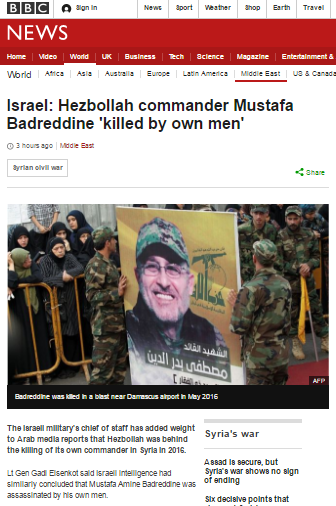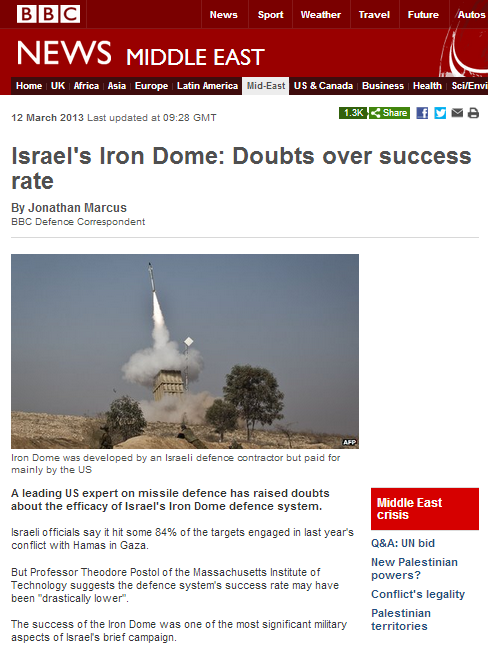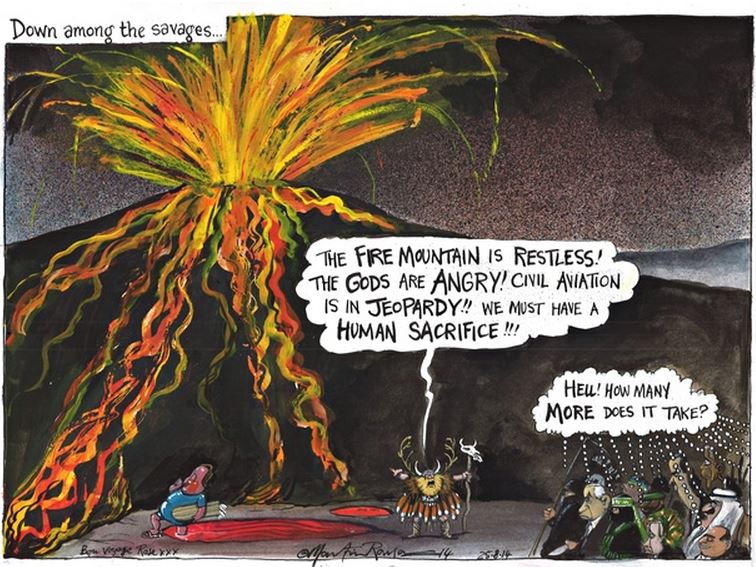Readers of an article published on the BBC News website on September 19th under the title “Mustafa Badreddine Street sparks outrage in Lebanon” found an economical description of the death of the person described as “a late military commander of the Hezbollah movement”:
“Badreddine – who was designated a terrorist by the United States – was killed in 2016 in Syria, where he was believed to have led Hezbollah units fighting in support of President Bashar al-Assad.”
The article included a link to the obituary for Badreddine published by the BBC News website in May 2016 and readers who bothered to follow it would have read that:
“Mustafa Amine Badreddine, who has been killed in Syria, was a top Hezbollah military commander.
He was killed by jihadist artillery fire on a Hezbollah base near Damascus airport, the group said. […]
His death was initially blamed on Israel, Hezbollah’s chief enemy.
But Hezbollah later said its commander had been killed in a bombardment carried out by Sunni extremists. It has not named any of the groups.”
Any member of the BBC’s audience searching online for more information on the circumstances of Badreddine’s death in 2016 would, however, be likely to have come across BBC reports presenting conflicting information.
An article published on the BBC News website in March 2017 reported that:
“The Israeli military’s chief of staff has added weight to Arab media reports that Hezbollah was behind the killing of its own commander in Syria in 2016.
Lt Gen Gadi Eisenkot said Israeli intelligence had similarly concluded that Mustafa Amine Badreddine was assassinated by his own men.
He was killed by a blast near Damascus, which the militant Lebanese Shia group blamed on Sunni extremist rebels.”
Ten months earlier the BBC had initially blamed Badreddine’s death on Israel.
“A senior Hezbollah commander has been killed in an Israeli operation in Syria, the Lebanon-based Shia militant organisation says.
It says Mustafa Amine Badreddine died in an Israeli air strike near Damascus airport.
Israel has so far made no public comment on the claim.”
While the BBC subsequently backtracked its claim that Hizballah had made such a statement, its original report on Badreddine’s death remains online – including a section headed “Who could have killed Mustafa Badreddine?” which still points BBC audiences towards one very clear conclusion.
“Any of the armed groups seeking to overthrow Mr Assad might have sought to kill the man co-ordinating Hezbollah military activities. However, suspicion is likely to fall on Israel, which fought a war against Hezbollah in 2006.
Israel has been accused of killing several of the group’s leaders over the years, although it has never officially confirmed its involvement.
Hezbollah military chief Imad Mughniyeh was killed in a car bombing in Damascus in 2008 that US intelligence officials said last year was a joint operation by the CIA and Israel’s Mossad spy agency.
In January 2015, a suspected Israeli air strike in the Syrian Golan Heights killed six Hezbollah fighters, including Mughniyeh’s son Jihad, and an Iranian Revolutionary Guards general.
And in December, Hezbollah said one of its senior figures, Samir Qantar, was killed when missiles fired by Israeli jets struck a block of flats in Damascus.
Israel has also reportedly conducted air strikes aimed at preventing advanced weapons shipments from Iran from reaching Hezbollah via Syria.”
As we see, over two years on the BBC has now chosen to adopt and promote the official Hizballah account of Badreddine’s killing. Nevertheless the corporation – which relates to its online content as “historical record” – has let its previous unsubstantiated speculations remain online with no footnote added to inform BBC audiences that they are groundless.
Related Articles:
BBC News amplifies unreliable source on Hizballah commander’s death
Revisiting a BBC ‘Israel did it’ story from May 2016
BBC reports development in Hizballah story, fails to update original report




